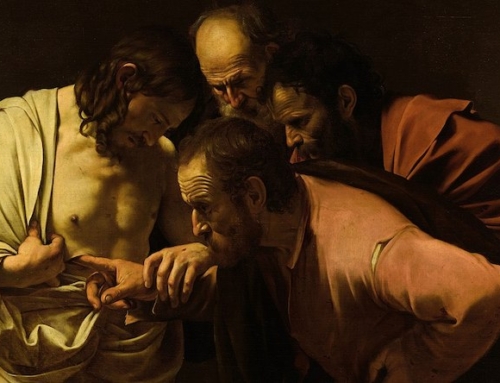A while ago, I was walking past a local Catholic bookstore, and I overheard part of a conversation between some Catholic undergraduates. “Why do you pick on me so much?” one complained playfully, to which the other responded, “If I didn’t how else would you suffer to merit glory in heaven?”
Though I recognized that this exchange was clearly playful banter, it sent me into thought about the matter. In what way is suffering linked to merit? Especially during Lent, when we add to our penances and perhaps really feel the smallness of those meals we have trimmed, it can be easy to think about the path to holiness as simply one of suffering. We look to the Cross of Jesus and seem to have this thought confirmed. Jesus was holy and Jesus suffered a lot.
When we look at Jesus, we often (and rightly) say that by suffering and dying for us, he merited our salvation. His passion and death are causes of our salvation. Nonetheless, St. Thomas tells us that sufferings and toils are meritorious only insofar as they are borne willingly (ST I-II q. 114, a. 4, ad 3). The strength to bear these difficulties willingly comes from love. In other words, it is by Christ’s love, his charity, that his passion and death become causes of our salvation. The immensity of his sufferings manifests his love: “God proved his love for us that while we were yet sinners, Christ died for us” (Rom 5:8). Elsewhere the same Apostle says, “Christ loved the church and gave himself up for her, that he might sanctify her” (Eph 5:25-26). The motive and power of Christ’s suffering is found in his infinite love.
Difficulty and suffering have a complex relationship with charity and merit. St. Thomas gives us two ways to consider it. “First, from the greatness of the work” (ST I-II q. 114, a. 4, ad 2). Great charity motivates great work, and so the difficulty is a sign of the charity and its merit, not the cause. Bringing the Gospel to unknown lands as a missionary or finding the means to serve the poor in a country plagued by poverty may involve many obstacles and difficulties; it is charity that works through them. “Secondly, from the defect of the operator” (ibid.). Tasks that involve self-denial and suffering are difficult because our own desires get in the way. We don’t want to clean the bathroom because it means we can’t relax or play a game instead. This sort of difficulty is healed by charity. By charity we love God above all and our neighbor for God’s sake, so we find not only supernatural strength but also a desire to perform those good actions that cost us time or treasure. In each case, we see that the grace of charity lies at the heart of merit.
When we ask ourselves how our Lenten penances are going, perhaps we could take St. Thomas’s lesson into account. Rather than asking how much we have given up, or how hard it has been, we can ask: have I borne these difficulties and penances for love of Jesus? May God grant us the grace to do all out of love for him.
✠
Image: Hans Memling, The Passion







